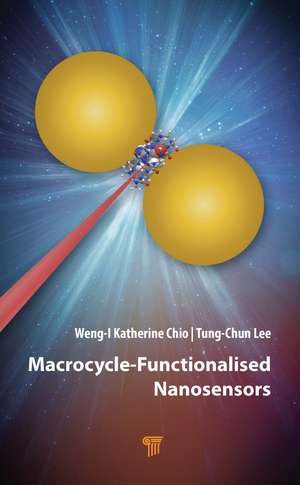Macrocycle-Functionalised Nanosensors
Autor Weng-I Katherine Chio, Tung-Chun Leeen Limba Engleză Hardback – 9 aug 2024
Preț: 1002.86 lei
Preț vechi: 1222.99 lei
-18% Nou
Puncte Express: 1504
Preț estimativ în valută:
191.89€ • 200.89$ • 158.78£
191.89€ • 200.89$ • 158.78£
Carte tipărită la comandă
Livrare economică 07-21 aprilie
Preluare comenzi: 021 569.72.76
Specificații
ISBN-13: 9789815129335
ISBN-10: 9815129333
Pagini: 272
Ilustrații: 238
Dimensiuni: 152 x 229 mm
Greutate: 0.54 kg
Ediția:1
Editura: Jenny Stanford Publishing
Colecția Jenny Stanford Publishing
ISBN-10: 9815129333
Pagini: 272
Ilustrații: 238
Dimensiuni: 152 x 229 mm
Greutate: 0.54 kg
Ediția:1
Editura: Jenny Stanford Publishing
Colecția Jenny Stanford Publishing
Public țintă
Academic and PostgraduateCuprins
1. Introduction 2. Host–Guest Chemistry of Macrocycles 3. Fabrication of Macrocyle-Functionalised Nanosensors 4. Optical Spectroscopy 5. Case Study: Nitroexplosives 6. Case Study: Urinary Biomarkers 7. Case Study: Methylxanthine Drugs
Recenzii
“This book ventures into the captivating realm of supramolecular chemistry, where molecular containers, particularly cucurbiturils, unlock new vistas in trace chemical detection. It serves as a beacon illuminating the path to understanding host–guest complexations and their practical applications through nanosensors. It adeptly guides readers from fundamental principles to advanced concepts, equipping them with the knowledge and skills necessary to navigate this cutting-edge domain. By elucidating the intricacies of macrocycle functionalisation, the book showcases how these molecular architectures empower the fabrication of nanosensors endowed with remarkable sensitivity and selectivity. An indispensable resource for scientists and researchers charting the frontier of molecular detection technologies.”
Prof. Xian Jun Loh
Institute of Materials Research and Engineering, A*STAR, Singapore
“This is a very interesting book that covers the synthesis techniques involving supramolecular chemistry and nanoparticles to develop exquisitely sensitive chemical sensors. The authors have gone to great lengths to summarise materials from a wide range of areas and to include some original data. The book acts as the Rosetta stone for those looking into host–guest interactions to detect trace chemicals. The well-produced diagrams and easy-to-follow text as well as the equations make it more interesting and helpful for final-year master’s students and academics in areas as diverse as chemistry, forensic science, condensed matter physics, and materials science. I will certainly recommend it to my students.”
Prof. Ivan P. Parkin
University College London, United Kingdom
Notă biografică
Weng-I Katherine Chio is a postdoctoral fellow at the University of Macau, China. She earned her BEng in materials science and engineering and MRes in nanomaterials from Imperial College London and PhD in chemistry from University College London (UCL), United Kingdom. She has authored and co-authored several peer-reviewed publications while acting as a journal reviewer. Her research interests include nanomaterials, supramolecular chemistry, and surface-enhanced Raman spectroscopy for on-site environmental monitoring and disease diagnostics.
Tung-Chun Lee is an associate professor of nanomaterials chemistry at UCL. He earned his BSc in chemistry from the University of Hong Kong in 2005 and PhD in chemistry from the University of Cambridge, United Kingdom, in 2012. He was a postdoctoral fellow at the Max Planck Institute for Intelligent Systems, Germany, from 2011 to 2014. At UCL, he leads an interdisciplinary group to explore chemistry under nano-confinement for catalysis and develops novel plasmonic sensors for trace chemical detection. His research interests include hybrid nanoparticles, nanofabrication, nanochemistry, supramolecular chemistry, active matter, and transmission electron microscopy.
Tung-Chun Lee is an associate professor of nanomaterials chemistry at UCL. He earned his BSc in chemistry from the University of Hong Kong in 2005 and PhD in chemistry from the University of Cambridge, United Kingdom, in 2012. He was a postdoctoral fellow at the Max Planck Institute for Intelligent Systems, Germany, from 2011 to 2014. At UCL, he leads an interdisciplinary group to explore chemistry under nano-confinement for catalysis and develops novel plasmonic sensors for trace chemical detection. His research interests include hybrid nanoparticles, nanofabrication, nanochemistry, supramolecular chemistry, active matter, and transmission electron microscopy.
Descriere
This introductory book is designed to offer fundamental insights into the nanosensing platforms based on macrocycle-functionalised nanoparticles, including nanoparticle synthesis and functionalisation, host–guest chemistry, and optical spectroscopies.
